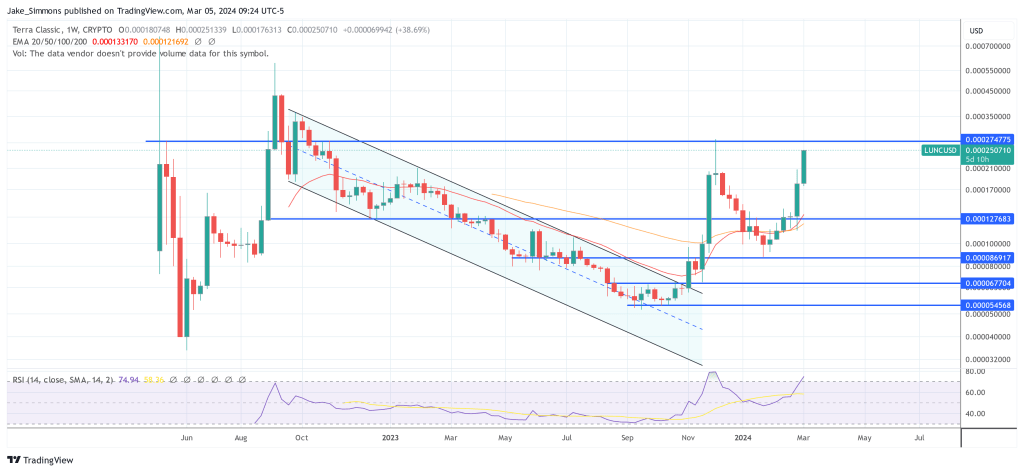On Tuesday, March 5, the Appellate Court of Montenegro has overruled the decision of the High Court of Podgorica, which had approved the extradition of Terraform Labs co-founder Do Kwon to the United States for criminal prosecution. The decision, dated March 5, 2024, nullifies the prior approval dated February 20, 2024, and mandates a retrial at the first-degree court, throwing a wrench into the international legal proceedings against the crypto entrepreneur.
Do Kwon Avoids US Extradition For Now: Here’s Why
The Appellate Court’s ruling came after identifying “significant violations of the provisions of criminal procedure” in the initial extradition order. The court highlighted a lack of “clear and valid reasons for decisive facts regarding the order of arrival request letter,” casting doubt on the procedural integrity of the extradition process.
Moreover, the court elaborated that the first-degree court’s determination hinged on the precedence of the extradition requests’ arrival – noting that the US request was received a day earlier than that of the Republic of Korea. However, it faulted the lower court for not adequately addressing the substance of a critical act from the Ministry of Justice dated July 19, 2023.
This omission was pivotal because it failed to consider the sequence and manner in which communications regarding the extradition requests were managed, particularly between Montenegro’s Ministry of Justice and the embassies of the United States and the Republic of Korea.
Furthermore, the appellate decision criticized the High Court for not properly binding the electronic communication from the Republic of Korea’s Ministry of Justice, which was sent to Montenegrin authorities on July 24, 2023. The appellate ruling underscored the legal framework that allows for electronic submissions to be considered valid, provided their authenticity can be verified and the originating judicial organ is prepared to furnish original documents within a stipulated timeframe.
The Appellate Court also questioned the High Court’s interpretation of international legal assistance laws, specifically critiquing its rationale behind prioritizing the U.S.’s extradition request. It pointed out a misapplication of the 1901 Criminal Tribunal Convention between the Kingdom of Serbia and the United States, underscoring a misunderstanding of the differences between temporary detention orders and formal extradition requests.
The Legal Saga Continues
This latest development is another chapter in the protracted saga of Do Kwon’s legal battles following the collapse of the Terra blockchain and its associated tokens, TerraUSD (UST) and Luna, in May 2022. The implosion of Terra’s ecosystem erased approximately $40 billion in market value, leading to fraud charges against Do Kwon by both the U.S. and South Korean authorities.
Kwon, who was arrested in Montenegro in March 2023 on charges of possession of falsified official documents, has been at the center of an intricate legal tug-of-war between South Korea and the United States, with both nations seeking his extradition. In December 2023, the Appellate Court had previously canceled the extradition approval to either country, emphasizing the need for a retrial at the Podgorica Basic Court.
The High Court in Podgorica had initially determined that Do Kwon could be legally extradited in November 2023, leaving the final decision to Montenegro’s minister of justice. However, the recent appellate ruling underscores procedural flaws and mandates a comprehensive review of the extradition request’s arrival order and associated legal documentation.
As the case returns now to the first-degree court for a new round of deliberations, the future of Do Kwon’s extradition remains uncertain. This decision delays, if not completely derails, the efforts of the US and South Korea to prosecute Kwon for his alleged role in the Terra ecosystem’s collapse.
At press time, Terra Luna Classic (LUNC) traded at $0.000250710.

Featured image from The National, chart from TradingView.com
 Bitcoin
Bitcoin  Ethereum
Ethereum  Tether
Tether  XRP
XRP  USDC
USDC  JUSD
JUSD  TRON
TRON  Lido Staked Ether
Lido Staked Ether  Dogecoin
Dogecoin  Figure Heloc
Figure Heloc  Cardano
Cardano  Wrapped stETH
Wrapped stETH  Bitcoin Cash
Bitcoin Cash  WhiteBIT Coin
WhiteBIT Coin  Wrapped Bitcoin
Wrapped Bitcoin  USDS
USDS  Binance Bridged USDT (BNB Smart Chain)
Binance Bridged USDT (BNB Smart Chain)  Wrapped eETH
Wrapped eETH  LEO Token
LEO Token  Monero
Monero  Chainlink
Chainlink  Hyperliquid
Hyperliquid  Coinbase Wrapped BTC
Coinbase Wrapped BTC  Ethena USDe
Ethena USDe  Canton
Canton  Stellar
Stellar  WETH
WETH  Zcash
Zcash  USD1
USD1  Litecoin
Litecoin  Sui
Sui  Avalanche
Avalanche  USDT0
USDT0  Dai
Dai  sUSDS
sUSDS  Shiba Inu
Shiba Inu  Hedera
Hedera  World Liberty Financial
World Liberty Financial  Ethena Staked USDe
Ethena Staked USDe  PayPal USD
PayPal USD  Toncoin
Toncoin  Cronos
Cronos  Rain
Rain  Polkadot
Polkadot  Uniswap
Uniswap  Tether Gold
Tether Gold  Mantle
Mantle  MemeCore
MemeCore 


